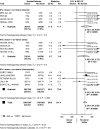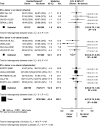Allogeneic, but not autologous, hematopoietic cell transplantation improves survival only among younger adults with acute lymphoblastic leukemia in first remission: an individual patient data meta-analysis
- PMID: 23165481
- PMCID: PMC4186648
- DOI: 10.1182/blood-2012-07-445098
Allogeneic, but not autologous, hematopoietic cell transplantation improves survival only among younger adults with acute lymphoblastic leukemia in first remission: an individual patient data meta-analysis
Abstract
Hematopoietic cell transplantation (HCT) and prolonged chemotherapy are standard postremission strategies for adult acute lymphoblastic leukemia in first complete remission, but the optimal strategy remains controversial. There are no randomized trials of allogeneic HCT. In the present study, updated individual patient data were collected and analyzed from studies with information on availability of matched sibling donor (used to mimic randomization) and from randomized trials of autograft versus chemotherapy. Data from 13 studies including 2962 patients, excluding Philadelphia chromosome-positive patients, showed a survival benefit for having a matched sibling donor for patients < 35 years of age (OR = 0.79; 95% CI, 0.70-0.90, P = .0003) but not for those ≥ 35 years of age (OR = 1.01; 95% CI, 0.85-1.19, P = .9; heterogeneity P = .03) because of the higher absolute risk of nonrelapse mortality for older patients. No differences were seen by risk group. There was a trend toward inferior survival for autograft versus chemotherapy (OR = 1.18; 95% CI, 0.99-1.41; P = .06). No beneficial effect of autografting was seen compared with chemotherapy in this analysis. We conclude that matched sibling donor myeloablative HCT improves survival only for younger patients, with an absolute benefit of approximately 10% at 5 years. Improved chemotherapy outcomes and reduced nonrelapse mortality associated with allogeneic HCT may change the relative effects of these treatments in the future.
Figures







Comment in
-
Young adults with acute lymphoblastic leukemia treated with a pediatric-inspired regimen do not need a bone marrow transplant in first remission.Blood. 2013 Jun 27;121(26):5253-5. doi: 10.1182/blood-2013-03-484592. Blood. 2013. PMID: 23813939 No abstract available.
-
Response: chemotherapy versus allogeneic transplantation in adult patients with acute lymphoblastic leukemia in first remission--not a time for dogma.Blood. 2013 Jun 27;121(26):5255. doi: 10.1182/blood-2013-05-498345. Blood. 2013. PMID: 23813940 No abstract available.
References
-
- Horowitz MM, Messerer D, Hoelzer D, et al. Chemotherapy compared with bone marrow transplantation for adults with acute lymphoblastic leukemia in first remission. Ann Intern Med. 1991;115(1):13–18. - PubMed
-
- Zhang M-J, Hoelzer D, Horowitz M, et al. Ann Intern Med. 1995;123(6):428–431. - PubMed
-
- Gray RG, Wheatley K. How to avoid bias when comparing bone marrow transplant with chemotherapy. Bone Marrow Transpl. 1991;7(Suppl 3):9–12. - PubMed
-
- Oliansky DM, Larson RA, Weisdorf D, et al. The role of cytotoxic therapy with hematopoietic stem cell transplantation in the treatment of adult acute lymphoblastic leukemia: update of the 2006 evidence-based review. Biol Blood Marrow Transplant. 2012;18(1):18–36. - PubMed
-
- Larson RA. Allogeneic hematopoietic cell transplantation is not recommended for all adults with standard-risk acute lymphoblastic leukemia in first complete remission. Biol Blood Marrow Transplant. 2009;15(1 Suppl):11–16. - PubMed
Publication types
MeSH terms
Substances
Grants and funding
LinkOut - more resources
Full Text Sources
Other Literature Sources

